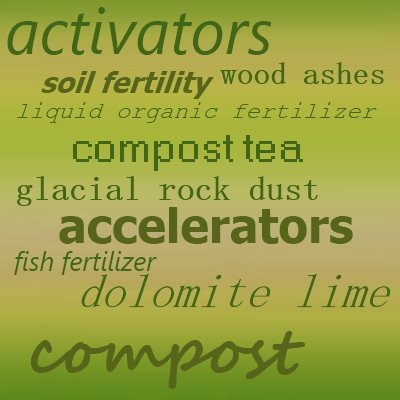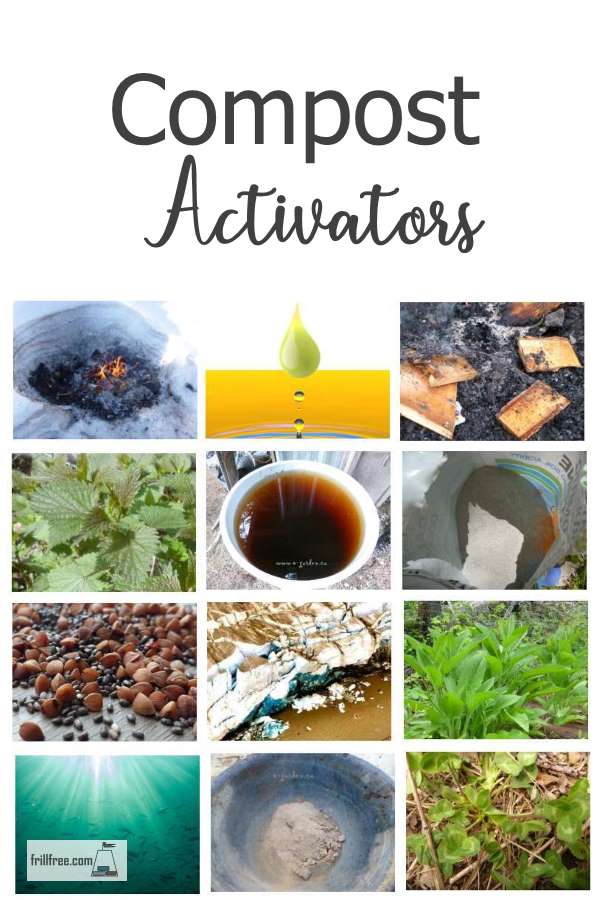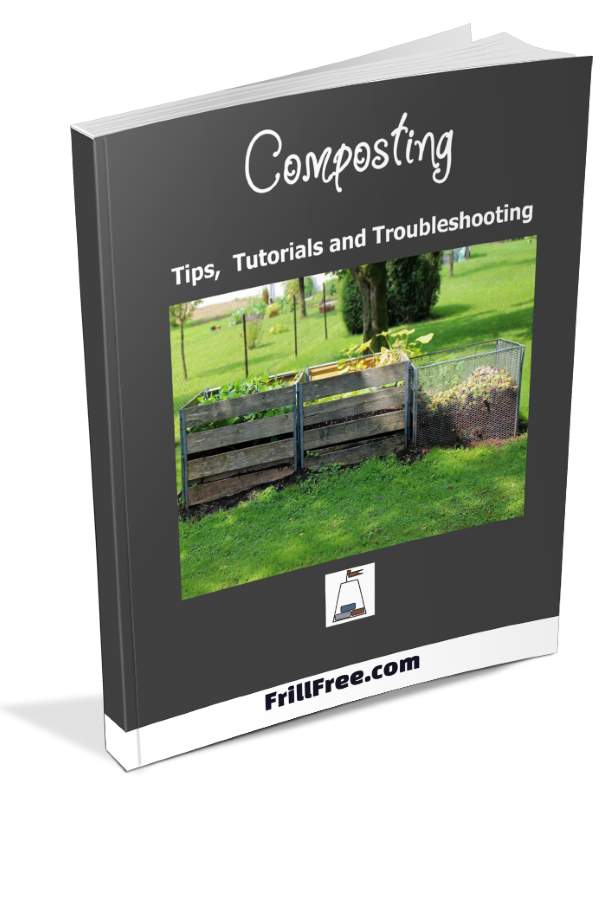- Homesteading
- Composting
- Compost Activators
Compost Activators
How To Get a Slow Compost Going Again
Making compost sometimes takes longer than it should for impatient gardeners like me.
Using compost activators can sometimes give your compost a boost and get it going quicker. This is especially important early in the spring when your winter compost needs some help.
Homemade Compost Catalyst: Accelerating Nature's Recycling Process
Composting is a natural process that transforms organic waste into nutrient-rich soil amendment, but sometimes nature needs a helping hand.
A compost catalyst, or compost accelerator, can significantly speed up the decomposition process, turning your kitchen scraps and yard waste into black gold more quickly and efficiently. While commercial accelerators are readily available, creating your own homemade compost catalyst is both cost-effective and environmentally friendly.
Fast compost retains more nutrients that will be available to plants more quickly; the more compost you make, the faster you can place it on the garden and get the plants growing.
Vegetables grown with compost made by the quick method are more nutritious, healthier and pest resistant.
Slow sluggish compost can be re-activated by adding certain materials which heat it up and get the micro-organisms re-energized.
The heat that a good working compost pile gives off is simply a sign that all is well, and the billions of micro flora and fauna - the tiny animals, bacteria and fungi - are thriving and reproducing at a rapid rate.
Heat in itself is not the aim; the microscopic life and its health is; feed the micro herd and the warmth it produces in its life processes is the byproduct.
Sometimes composting slows to a crawl, due to low temperatures, an unbalanced carbon nitrogen ratio, or lack of food for the micro herd. Get some action by adding one or more of these natural compost activators or catalysts to your compost pile.
Understanding Compost Catalysts
A compost catalyst works by introducing beneficial microorganisms and nutrients that stimulate decomposition. These catalysts provide the optimal conditions for bacteria and fungi to break down organic matter more rapidly.
The key elements in any effective compost catalyst include nitrogen-rich materials, beneficial microorganisms, and natural enzymes that help break down complex organic compounds.
Essential Ingredients for Homemade Catalysts
Several common household and garden items can be combined to create effective compost catalysts. These ingredients are typically rich in nitrogen, enzymes, or beneficial bacteria. Here are only a few of the many options:
1. Fresh Grass Clippings
Fresh grass clippings are high in
nitrogen and contain natural enzymes that aid decomposition. They're
readily available and cost nothing, making them an ideal base for
homemade catalysts.
2. Beer or Beer Dregs
The yeasts present in
beer are excellent decomposers and can significantly accelerate the
composting process. Flat beer or leftover dregs work perfectly well for
this purpose.
3. Molasses
Molasses provides sugar that feeds beneficial bacteria
and fungi, helping them multiply rapidly. It's an excellent energy
source for microorganisms.
4. Coffee Grounds
Used coffee grounds are rich in nitrogen and contain compounds that attract earthworms, which are natural decomposers.
5. Comfrey Leaves
Comfrey is known as a dynamic accumulator,
concentrating nutrients from the soil in its leaves. These nutrients,
particularly nitrogen and potassium, make it an excellent catalyst
ingredient.
Basic Homemade Catalyst Recipes
Here are several effective recipes for homemade compost catalysts:
Simple Liquid Catalyst:
- 1 can of beer
- 1 cup molasses
- 1 gallon water
Mix ingredients thoroughly and apply to your compost pile while turning it.
Herbal Enzyme Catalyst:
- 2 cups chopped comfrey leaves
- 1 cup nettle leaves
- 1 cup grass clippings
- 2 gallons water
Steep the plant materials in water for 24-48 hours, strain, and use the liquid to moisten your compost pile.
Advanced Fermented Catalyst:
- 2 cups used coffee grounds
- 1 cup molasses
- 1 can beer
- 1 cup garden soil (contains native beneficial microorganisms)
- 5 gallons water
Allow mixture to ferment for 5-7 days before use.
Application Methods
The effectiveness of your homemade catalyst depends largely on proper application:
1. Even Distribution
Apply the catalyst evenly throughout the pile, not just on the surface. This ensures uniform decomposition.
2. Moisture Balance
Use the catalyst to maintain proper moisture levels - the pile should be as damp as a wrung-out sponge.
3. Regular Application
Apply the catalyst every time you add new materials to the pile or during regular turning sessions.
4. Temperature Monitoring
Monitor the pile's temperature after application. A successful catalyst will cause a temperature increase within 24-48 hours.
Maximizing Catalyst Effectiveness
To get the most from your homemade catalyst:
1. Proper Pile Construction
Maintain a good balance of green (nitrogen-rich) and brown (carbon-rich) materials in your pile.
2. Regular Turning
Turn the pile regularly to incorporate the catalyst and maintain aerobic conditions.
3. Size Management
Keep the pile at least 3 feet cubed to maintain proper internal temperature.
4. Seasonal Adjustments
Adjust catalyst recipes and application rates based on seasonal conditions.
Benefits of Homemade Catalysts
Using homemade compost catalysts offers several advantages:
1. Cost-Effective
Most ingredients are readily available and inexpensive compared to commercial products.
2. Environmental Friendly
Homemade catalysts contain no synthetic chemicals and often utilize items that might otherwise be wasted.
3. Customizable
Recipes can be adjusted based on available materials and specific composting needs.
4. Educational Value
Making your own catalyst helps you understand the composting process better.
Troubleshooting Common Issues
When using homemade catalysts, you might encounter:
1. Slow Response
If the pile doesn't heat up after catalyst application, check moisture levels and material balance.
2. Odors
Strong odors might indicate too much moisture or nitrogen. Adjust your catalyst recipe accordingly.
3. Pest Problems
If pests are attracted to your pile, ensure you're burying food scraps and maintaining proper coverage.
Safety Considerations
While homemade catalysts are generally safe, keep these points in mind:
1. Use clean containers for mixing and storing catalysts
2. Wear gloves when handling materials
3. Store catalysts away from children and pets
4. Label all mixtures clearly
5. Use within a reasonable time frame to prevent unwanted fermentation
Conclusion
Creating your own compost catalyst is a rewarding way to enhance your composting efforts. By understanding the basic principles and having a few reliable recipes on hand, you can significantly accelerate the decomposition process while maintaining an environmentally friendly approach.
Keep in mind that successful composting is as much art as science - don't be afraid to experiment with different ingredients and ratios to find what works best in your specific situation.
With proper application and maintenance, your homemade catalyst can help transform organic waste into valuable compost more quickly and efficiently than nature alone.

Other single ingredient compost activators can be added to your compost pile to provide for the health and well being of your micro herd.
- Sometimes simply the addition of Dolomite lime (a finely ground
and powdery addition), can change an acid and slowly fermenting compost of pine needles
to a rip roaring furnace of nutrient production. Wood ashes perform a similar function, and are cheap or free, ever a consideration for the frugal gardener.
- Glacial rock dust is a valuable addition to the compost bin as it adds the minute amounts of nutrients that the micro herd needs.
- Compost tea can be sprinkled on to stir things up, giving even a carbon rich pile of wood shavings from a barn the extra nitrogen for rapid decomposition.
- Urine, either human or from a horse barn can be used to quickly fire a pile of sticks or leaves. This has also been termed Liquid Organic Fertilizer or L.O.F.
Using any of these forms of rapidly available urea or nitrogen can get a slow cold compost pile moving again, or the addition of a catalyst that simply changes the pH of the compost sometimes is all that's needed.
Some compost activators are commercially available, but expensive, so using those that you can produce yourself is better for your sustainable garden.
Caution:
Adding grain can give vermin a food source but by placing these types of things in the center of the pile only, and watering well after adding them so they heat up quickly, your pile will be inhospitable to mice or rats.
- A mixture of dried weeds or cover crops such as comfrey,
alfalfa, nettles, mullein and many other accumulators adds that elusive minor
element or missing nutrient. All of these cover crops delve deep into the ground with their heavy root systems, reaching further into the subsoil than your crops could ever do.
- Mixing or layering in rancid flour or grain, spoiled chicken or other animal feed, or alfalfa pellets can give a compost pile the activation it needs to get good and hot.
Compost activators sometimes go by the name compost starters or compost boosters.
Whatever you call them, they are great at getting a slowing decomposition process back on track. Some activators are high in nitrogen, like blood meal or other rich materials. Alfalfa meal is a good source of easily accessible extra nitrogen which gets microbial activity active again.
Without the healthy and huge numbers of beneficial microbes, no composting process will take place.
A single ingredient compost bin can easily falter and slow, such as a pile of grass clippings or wood chips. They need the addition of either carbon materials in the the grass clippings, or green materials in the case of wood chips.
Good compost consists of a wide variety of ingredients, the more the better - beneficial microorganisms demand a varied diet.
Dry leaves, even though they will eventually rot down into leaf mould, will rot much more quickly in combination with coffee grounds and other kitchen scraps, organic material and gallons of water to thoroughly wet the new pile.
After a while, the humic acid forms as the organic matter breaks down.
If there are worms, you'll get valuable worm castings too, as the finished product slowly emerges from a pile of food waste or garden refuse.
Worm compost is a great way to make your own liquid fertilizer in the form of worm tea.
Whichever way your new compost pile leans, keep the oxygen levels and moisture content in check and you can give chemical fertilizers the boot.
Compost activators are yet another ally in the organic and sustainable garden for getting more compost faster.
You can never have too much compost; in fact, I don’t think you can ever have enough.
















